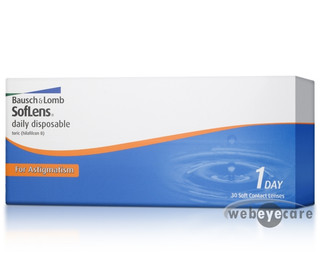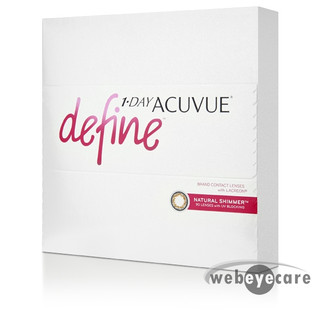Types of Contact Lenses
Knowing the different types is a key aspect in finding the right contact lens for you. Daily, weekly/bi-weekly, monthly, color, toric and multifocal lenses all have their own benefits. Here's what you need to know about each one:
- Daily Contact Lenses: They're disposable. Wear them once and then toss ‘em out. This option is perfect if you don't want to deal with the hassle of cleaning your lenses every night. They also have a lower risk of infection from buildup that can accumulate over longer periods of time.
- Weekly/Bi-Weekly Contact Lenses: Want something cheaper? These lenses are replaced every one to two weeks. They help you save some dough but still give you the feeling of a fresh pair when compared to monthly lenses.
- Monthly Contact Lenses: As the name suggests, this type is built to last for 30 days straight. You'll need to clean them regularly, but they're pretty cost-effective if you wear them all the time.
- Color Contact Lenses: Adventure away from your natural eyes for something more… exotic? Color lenses enhance or completely change eye color for cosmetic purposes. They are available with or without vision correction.
- Astigmatism/Toric Contact Lenses: Designed specifically for astigmatism, toric lenses have different powers in various lens meridians to correct your vision perfectly.
- Bifocal/Multifocal Contact Lenses: Can't see things up close? That's presbyopia getting you down but fear not! These lenses have multiple lens powers within themselves so that you'll be able to see everything clearly at any distance, both near and far.
Popular Brands of Contact Lenses
Materials and Technology
The comfort of the lens and how effective it is all depends on the material used in making it. This part will give you a better understanding of the different lens materials, oxygen permeability as well as moisture retention technologies:
- Materials Used in Lens Manufacturing: Hydrogel or silicone hydrogel are the primary components used to make contact lenses. Silicone hydrogel lenses are more advanced than regular ones as they allow greater oxygen transmission which is crucial for extended wear.
- Oxygen Permeability: Maintaining corneal health is what this factor focuses on because having sufficient oxygen transmission is key. Lenses that have high oxygen permeability reduce risks of getting complications from corneal hypoxia.
- Moisture Retention Technologies: Staying comfortable after long hours can be hard but these lenses have some great features embedded in them. Some of these features include water-holding molecules or using hydrophilic (water-attracting) materials which help keep your eyes moist even when they're dry.
Usage and Care
To make sure your eyes are being taken care of while wearing these lenses, you'll need to follow some good usage and contact lens care guidelines. Here's what you need to know about inserting them correctly, cleaning them properly and replacing them when needed:
- Proper Insertion and Removal Techniques: Damaging the lenses isn't something that should happen if you've learned how to insert and remove them properly. It'll also lower the chances of irritating or infecting your eye through methods like this too.
- Cleaning and Disinfection: Getting rid of any harmful microorganisms on your lenses before putting them back in is absolutely necessary. Using appropriate solutions during a proper cleaning session will prevent buildups from happening as well.
- Handling and Storage: Keeping clean hands at all times during handling is important so if you don't then make sure they're dry at least. When storing your lenses away in a case, make sure it's clean and filled with fresh disinfecting solution.
- Replacement Schedules: Following this schedule is crucial for your eyes' health. Wearing the same pair for too long could lead to something bad happening so always remember when you should replace them.
Benefits and Advantages
Contact lenses are a great way to improve your vision. They're also really good for improving how you look overall too! Here are the top benefits that make them such a preferred choice:
- Better Vision: The glasses just won't cut it, they get in the way of what you can see around you and can even distort what's right in front of you!
- Greater Field of Vision: You'll be able to see more of the world when your lenses move with your eyes, instead of having frames in the way.
- Comfort and Convenience: For the active folks, these won't fog up or fall out as easily as glasses will!
- Cosmetic Benefits: Sometimes it's all about how we look. Colored lenses can help enhance or completely change your eye color.
From Glasses to Contact Lenses: The Transition
Moving from glasses to contacts is a whole new routine. You will have to go through an adjustment period when your eyes will have to adapt to the feeling of lenses in them. Initially, you should only wear your contacts for 1 or 2 hours at a time. Then, increase it by an hour each day until you are comfortable enough to keep them on all day long.
In addition, make sure you always follow hygiene practices like washing your hands before handling and using proper solutions.
The Emotional Boost of Wearing Contacts
Once you get over that hump, it’s hard not to notice how much better they are than glasses for certain things. No longer will they fog up or fall off of your face when running around during physical activity.
With contacts there are no restrictions in peripheral vision and it provides an unobstructed view with more natural vision which many people find enhances their self-esteem.
Selecting Contacts for Your Lifestyle
Soft contact lenses vs hard contact lenses: This is an important factor to consider if you want to focus on comfort and clear vision. It can also help avoid eye health issues and ensure you have the right pair for everyday activities.
When making the right choice of lenses for your lifestyle, comfort is key. Soft lenses offer immediate comfort, while rigid gas permeable lenses provide sharper vision and could be better for specific eye conditions. If you have a lifestyle where you're always on-the-go, then you might find daily disposables convenient. And if you don’t want frequent replacements, then extended wear lenses may be your best option.
Eye Care Professionals and Their Role in Your Vision Solution
The most important thing to do when trying out contact lenses is talking to an eye care professional first. They’ll be able to assess things like what type of lens would best fit your personal needs as well as lifestyle requirements and overall vision requirement based on your eye health.
Regular check-ups will ensure that everything is going smoothly with the new change and that improper use or fit isn’t causing any complications in the future!
Buying Contact Lenses Online
Save yourself from getting into rush hours and buy your contacts online. Here at WebEyeCare, we have been helping our customers to buy contacts at an affordable price while prioritizing their eye comfort. That's why we only sell the best contact lenses from top brands known for their quality and comfort. Let us help you order your contact lenses online in the right way!
The first thing to do when shopping for online contact lenses is to ensure you have a
valid prescription, as there are different contact lens brands. You'll need to provide your prescription information when ordering, and it's important to ensure it's up to date. If you're unsure if your prescription is still valid, you can always call your eye doctor to check. It might also be wise to learn
how to read your contact lens prescription to make sure that the lenses you buy are suited for your vision correction .
When you order contact lenses online, many types of contacts are available, so it's important to find the one prescribed by your doctor. Not only that, but there are many different options, so you want to make sure you select the one that's best for your needs by discussing it with your doctor. However, to buy cheap contact lenses online, check for discounted contact lenses so that you may get the best possible deal at an affordable price.
Frequently Asked Questions
Is it better to wear contacts than glasses?
The best option for each individual may vary depending on their specific vision, needs, and lifestyle. However, some general considerations are as follows;
- How severe your vision impairment is. If you have poor vision, contacts may provide better vision than glasses.
- How often do you need to wear corrective lenses? If you only need to wear lenses occasionally, glasses may be more convenient.
- Your lifestyle and activities. Contacts may be better if you play sports or have a job requiring physical activity.
Are contact lenses painful?
No, contact lenses are not painful. They are often quite comfortable to wear. There may be a bit of initial discomfort when first putting in contacts, but this typically goes away within a few minutes. There are also a variety of contact lenses available that are designed for people with sensitive eyes.
Is it okay to wear contact lenses every day?
Yes, it is perfectly fine to wear contact lenses every day. Many people do so without any problems whatsoever. However, it is important to remember that you must handle contact lenses with care.
How do you wear contact lenses for the first time?
You must remember the following things to ensure you are doing it correctly.
- Wash your hands thoroughly to help prevent bacteria from getting on your lenses.
- Check your contact lenses to ensure they are not damaged.
- Hold the lens on your finger and then carefully place it on your eye.
You may need to blink a few times so the lens can settle.
Note: If the lens feels uncomfortable or is not sitting right, take it out and try again.
Can you swim with contacts in?
No, you cannot swim with contacts in. Water can cause your contacts to become dirty or lost. There is also a risk of bacteria and other microorganisms getting trapped underneath the contact lens, which can lead to an eye infection (corneal ulcer). If you must swim with contacts, wear goggles, remove your contacts as soon as you are done swimming, and thoroughly clean and disinfect your lenses afterward.
How do I get my contacts out?
To remove your contact lenses (disposable):
- Wash your hands with soap and water.
- Apply some lubricating drops to your eyes if they are dry.
- Gently peel the lens off your eye, starting at the outer edge.
If you have hard lenses:
- Squeeze the lens gently between your thumb and index finger.
- Do this gently until you're able to break the seal of the lens from your eye.
Can you sleep with contacts in?
Yes, you can sleep with contacts, but it's not recommended. It can lead to corneal ulcers and open sores in the eye. Moreover, it can dry out your eyes. When you sleep, your eyes do not blink as often as when awake. This lack of blinking can lead to dryness and irritation. So, while you can technically sleep with contacts, it's not the safest option.
How long does it take for eyes to adjust to contacts?
It takes a few days for your eyes to adjust to the lenses and feels more comfortable. After that, you should be able to wear them all day without any problems. In the meantime, you may experience some mild discomfort, such as a feeling of dryness, itching, or burning. These symptoms should subside as your eyes become used to the lenses.
Why did my eyes burn when I put my contacts in?
Your eyes may have burned if you are allergic to the material of your lenses, or you could be wearing them too long. If your eyes continue to burn after you've tried cleaning your lenses and using fresh solution, do not delay making an appointment to see your eye doctor.
Do you need a valid prescription to order contacts online?
Yes, in the United States, a valid prescription with the brand prescribed listed on it is required to purchase contact lenses from an online retailer. However, in other countries, such as Canada, prescriptions are not brand-specific.
How long should I rest my eyes on contacts?
If you wear contacts regularly, it is recommended that you take them out for at least one week every four to six months to give your eyes a break. If you don't wear contacts often, you will probably be fine with taking them out for one week every
six to eight months.
Can you get your contacts online?
Yes, you can buy contact lenses online, but you'll need a valid prescription from an eye care professional. One way is to order them through an online retailer. Another way is to order them through your eye care provider. And finally, you can order them through a lens manufacturer.
How long should I wear contacts as a beginner?
If you're starting to wear contacts, it's important to follow the recommended wearing schedule set forth by your eye care professional. For most people, that means wearing contacts for no more than eight hours per day during the initial period. Afterward, you can gradually increase the time you wear them until you reach the maximum recommended wearing time.
How long do contact lenses last?
Most people assume that contact lenses will last forever, but the truth is that they don't. Contact lenses are made from materials that break down over time and eventually need to be replaced. The average lifespan of a contact lens is about two years, but it can vary depending on the lens type and how well you take care of them.
Who should avoid contact lenses?
A few people should avoid contact lenses, as they may be at increased risk for complications. These include:
- Infants and young children
- Those with allergies or sensitivities to contact lens materials
- Those with certain eye conditions (e.g., keratoconus)
- Those with dry eyes
- Those who are not able to follow proper hygiene guidelines
Are contact lenses safe to wear?
Contacts are safe to wear when used properly. We recommend you consult your eye care specialist to guide you on which contact lenses to use and how to use them. There are however some individuals who might be allergic to materials used in contact lenses. It is important that if you see any signs of an allergic reaction you remove your contact lenses immediately and consult with your eye care specialist.
How do I choose the right contact lenses for my eyes?
The right contact lenses depend on your specific eye condition and needs. You must consult with your optometrist or eye care professional. They can perform a comprehensive eye exam and recommend the best contacts for you. They can also guide you about how to use and maintain your contact lenses.
What are the different types of contact lenses available?
The most common types of contact lenses include daily disposable, weekly disposable, biweekly disposable, and monthly disposable contact lenses. They are also toric contact lenses for astigmatism and multifocal for presbyopia. We carry contact lenses from your favorite brands like Biofinity, Clariti, Air Optix, Acuvue, and many more.
How do I clean and care for my contact lenses?
It is important to clean your contact lenses daily to avoid the development of eye irritation or infection.
- Wash your hands thoroughly with mild soap.
- Dry with a lint-free towel before touching your lenses.
- Handle your lenses with your fingertips.
- Follow instructions on solution labeling and do not mix different brands or types of solutions.
- Do not use saliva or anything other than the recommended solutions for lubricating or rewetting your lenses. Never rinse your lenses in water from the tap as this can lead to contamination.
You can also ask for the assistance of your eyecare provider for any further instructions.
What if my contact lens falls out or becomes dislodged?
If your contact lenses fall out or become dislodged remove them immediately and rinse with contact lens solution. Check the lens for any debris or damage. You can reinsert the lens if it’s still in good condition. Never use tap water to rinse your lenses as it may contain harmful bacteria that can lead to eye infections.
Can children wear contact lenses?
Yes, children can wear contact lenses. It is recommended that your child is at least 8-9 years of age so they can properly care for their contacts. You can consult your eye care specialist to determine the best option for your child.
How often should I replace my contact lenses?
The replacement schedule varies depending on the type of contact lenses. For example, Daily disposables need to be replaced after each use, monthly disposables need to be replaced once a month, etc. We recommend you follow the replacement schedule recommended by the manufacturer and your eye care professional.
Do I still need glasses if I wear contact lenses?
Even if you wear contact lenses it is nice to have glasses as backup. You must allow your eyes to rest from time to time.
Can I wear contact lenses if I have astigmatism?
Yes, people with astigmatism can use specialized contacts made for astigmatism called toric contact lenses. Brands that offer toric contact lenses include Acuvue, Biofinity, Air Optix, Proclear, and PureVision.
 Save yourself from getting into rush hours and buy your contacts online.
Save yourself from getting into rush hours and buy your contacts online.
 Seeing double? Ditch the blurry vision with an upgrade in prescription glasses and readers.
Seeing double? Ditch the blurry vision with an upgrade in prescription glasses and readers.

























